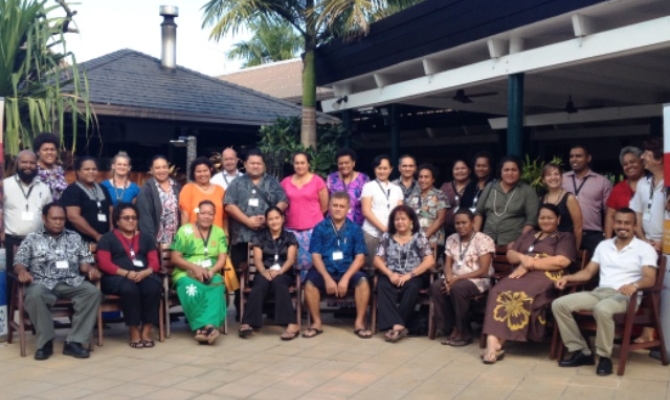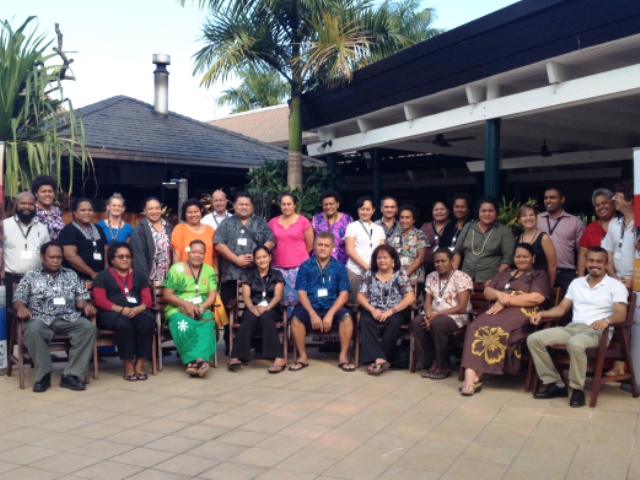
Island and Ocean Ecosystems
Access and Benefits Sharing (ABS) refers to the fair and equitable sharing of the benefits arising out of the utilisation of genetic resources. The Pacific islands are home to a rich biodiversity and this issue is one that may have impact on island communities.
In 2010 an international agreement (the Nagoya Protocol) was adopted to put in place measures that will benefit not only the providers but also the users of genetic resources and biochemicals found in plants, animals and microorganisms.
Today ended a one week regional workshop jointly led by the Secretariat of the Pacific Regional Environment Programme (SPREP) and the ABS Capacity Development Initiative in Nadi, Fiji to help strengthen the ability of countries to implement this Protocol at the national level.
The training focused on helping participants understand how to negotiate contracts between the providers (such as communities and countries) with the users of genetic resources.

"Due to the important need for legal recognition of our genetic resources, Samoa has drafted the Environment Management and Conservation Bill to domesticate its obligations under the Nagoya Protocol," said Mr. Lesaisaea Niualuga T. Evaimalo, Principal Terrestrial Biodiversity Officer, Ministry of Natural Resources & Environment (MNRE) of Samoa.
"This training will hopefully lead to a process or a standard contract agreement with terms and conditions to better protect and recognise the significance of our biological, genetic resources and traditional knowledge."
The official title of the international agreement is The Nagoya Protocol to the Convention on Biological Diversity on Access to Genetic Resources and the Fair and Equitable Sharing of Benefits Arising from their Utilization.
Benefits derived from genetic resources may include the result of research and development carried out on those genetic materials, the transfer of technologies which make use of that research, or monetary benefits arising from the commercialisation of products based on those genetic resources.
"This training has provided an opportunity to exchange information and lessons learned amongst Pacific islands, especially on how we navigate through the ABS checkpoints by following the different phases from access, utilisation, research, development of genetic resources and their associated traditional knowledge," said Ms. Alissa Takesy, Assistant Secretary of the Department of Resources and Development, FSM.
"This is where it seems the law, science and art fields cross paths to seek consensus on a biological resource through a fair and equitable outcome between parties."
An example of the different uses of the genetic resources in the Pacific islands is prostratin, a compound found in the bark of the mamala tree of Samoa, Homalanthus nutans. Research has indicated that prostratin has potential to be useful in the treatment of HIV-AIDS. Some benefits have flowed back to Samoa and the traditional healers through which the compound was identified.
A second example is the distribution of the Samoan ma'afala breadfruit variety to 27 countries worldwide to help strengthen food security in these nations. This variety was selected out of 120 different types that were tested for over a decade and was found to have the highest nutritional value. As part of a partnership project between the Government of Samoa and the Hawaii National Tropical Botanical Gardens, a royalties cheque of just over 12,000 USD was presented to Samoa based on ma'afala variety sales over two years.
The Protocol recognises that indigenous knowledge should be protected and communities that possess it must be adequately compensated if that knowledge is used for commercial gain.
"There will be a role for communities as the source of genetic resources and traditional knowledge associated with those resources. There will be a role of government both as regulators and also as a source of genetic resources," said Mr. Clark Peteru, Legal Adviser at SPREP.
"As stewards of our lands, everyone plays a role in this Protocol."
To date Fiji, Federated States of Micronesia, Samoa and Vanuatu are Parties to the Protocol with more Pacific island countries expected over the next 12 months.
NOTES:
The Training on Mutually Agreed Terms: Contracts for making Access and Benefit Sharing Possible ends today, it was held in Nadi, Fiji from 5 – 8 August. The training was made possible through a grant from GIZ through collaboration with the Secretariat of the Pacific Regional Environment Programme and the ABS Capacity Development Initiative. Partners supporting this training are the Secretariat of the Pacific Community, University of the South Pacific, United Nations Development Programme and International Union for the Conservation of Nature.
The Pacific island countries attending the training are: Cook Is, Fiji, FSM, Kiribati, Marshall Is, Nauru, PNG, Samoa, Solomon Is, Tonga, Tuvalu, Vanuatu. Territories are Wallis and Futuna and Tokelau.
The trainers are lawyers Morten Tvedt from the Nansen Institute, Norway and Dr. Kabir Bavikatte from United Nations University, Japan.
In 2010 an international agreement (the Nagoya Protocol) was adopted to put in place measures that will benefit not only the providers but also the users of genetic resources and biochemicals found in plants, animals and microorganisms.
Today ended a one week regional workshop jointly led by the Secretariat of the Pacific Regional Environment Programme (SPREP) and the ABS Capacity Development Initiative in Nadi, Fiji to help strengthen the ability of countries to implement this Protocol at the national level.
The training focused on helping participants understand how to negotiate contracts between the providers (such as communities and countries) with the users of genetic resources.

"Due to the important need for legal recognition of our genetic resources, Samoa has drafted the Environment Management and Conservation Bill to domesticate its obligations under the Nagoya Protocol," said Mr. Lesaisaea Niualuga T. Evaimalo, Principal Terrestrial Biodiversity Officer, Ministry of Natural Resources & Environment (MNRE) of Samoa.
"This training will hopefully lead to a process or a standard contract agreement with terms and conditions to better protect and recognise the significance of our biological, genetic resources and traditional knowledge."
The official title of the international agreement is The Nagoya Protocol to the Convention on Biological Diversity on Access to Genetic Resources and the Fair and Equitable Sharing of Benefits Arising from their Utilization.
Benefits derived from genetic resources may include the result of research and development carried out on those genetic materials, the transfer of technologies which make use of that research, or monetary benefits arising from the commercialisation of products based on those genetic resources.
"This training has provided an opportunity to exchange information and lessons learned amongst Pacific islands, especially on how we navigate through the ABS checkpoints by following the different phases from access, utilisation, research, development of genetic resources and their associated traditional knowledge," said Ms. Alissa Takesy, Assistant Secretary of the Department of Resources and Development, FSM.
"This is where it seems the law, science and art fields cross paths to seek consensus on a biological resource through a fair and equitable outcome between parties."
An example of the different uses of the genetic resources in the Pacific islands is prostratin, a compound found in the bark of the mamala tree of Samoa, Homalanthus nutans. Research has indicated that prostratin has potential to be useful in the treatment of HIV-AIDS. Some benefits have flowed back to Samoa and the traditional healers through which the compound was identified.
A second example is the distribution of the Samoan ma'afala breadfruit variety to 27 countries worldwide to help strengthen food security in these nations. This variety was selected out of 120 different types that were tested for over a decade and was found to have the highest nutritional value. As part of a partnership project between the Government of Samoa and the Hawaii National Tropical Botanical Gardens, a royalties cheque of just over 12,000 USD was presented to Samoa based on ma'afala variety sales over two years.
The Protocol recognises that indigenous knowledge should be protected and communities that possess it must be adequately compensated if that knowledge is used for commercial gain.
"There will be a role for communities as the source of genetic resources and traditional knowledge associated with those resources. There will be a role of government both as regulators and also as a source of genetic resources," said Mr. Clark Peteru, Legal Adviser at SPREP.
"As stewards of our lands, everyone plays a role in this Protocol."
To date Fiji, Federated States of Micronesia, Samoa and Vanuatu are Parties to the Protocol with more Pacific island countries expected over the next 12 months.
NOTES:
The Training on Mutually Agreed Terms: Contracts for making Access and Benefit Sharing Possible ends today, it was held in Nadi, Fiji from 5 – 8 August. The training was made possible through a grant from GIZ through collaboration with the Secretariat of the Pacific Regional Environment Programme and the ABS Capacity Development Initiative. Partners supporting this training are the Secretariat of the Pacific Community, University of the South Pacific, United Nations Development Programme and International Union for the Conservation of Nature.
The Pacific island countries attending the training are: Cook Is, Fiji, FSM, Kiribati, Marshall Is, Nauru, PNG, Samoa, Solomon Is, Tonga, Tuvalu, Vanuatu. Territories are Wallis and Futuna and Tokelau.
The trainers are lawyers Morten Tvedt from the Nansen Institute, Norway and Dr. Kabir Bavikatte from United Nations University, Japan.